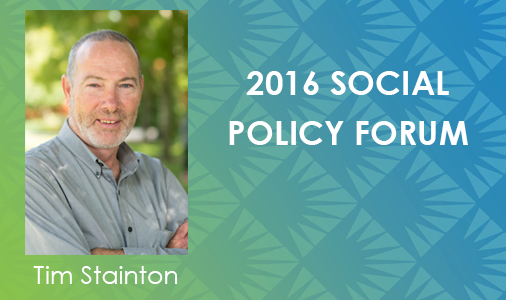
In collaboration with Ryerson University, Community Living Ontario’s Social Policy Forum will explore policy related to the direct funding of supports and services for people in the province who have an intellectual disability.
Stainton, a Professor and Director at UBC’s School of Social Work and the Centre for Inclusion and Citizenship, will explore the broader concepts for self-determination as they relate to direct funding.
He acknowledges that individualized and direct funding are big parts of living a life of one’s choosing, but without additional supports it’s “not effective in terms of actually allowing people to get on with their lives, at least for [people with an intellectual disability].”
As part of his presentation, he will examine the elements needed in a structure to make it effective, in terms of allowing people to develop and lead a life that they want to lead. For him, decision-making for people with an intellectual disability is also important, both formal decision-making structures and the more informal supports.
“What we’re really looking at there is how to ensure that someone who doesn’t communicate formally can actually have a voice in this system. So it’s a lot about family advocacy, network support, micro-boards, supported decision-making, those kinds of things.”
Stainton says more technical supports that go with individualized funding, such as service brokerage and administrative type supports are also needed. He also feels governance plays a significant role in self-determination, which includes involvement from service providers. If self-determination is to occur among people with an intellectual disability, Stainton says they must be involved in the governance of those organizations.
Later in the day, the forum will turn its attention on what’s been developed over the last 30 years with respect to individualized and direct funding, including the pitfalls some jurisdictions have encountered.
Stainton will be sharing some of the research and experiences he’s encountered in other parts of the world, including British Columbia, the United Kingdom, the United States, Australia, as well as some examples that the province of Ontario might want to avoid.
He believes that supports like planning are often seen as add-ons rather than as part of the individualized funding structure, or it’s utilized in unique circumstances like supporting transitional-aged youth.
“Our experience is that most people do need that kind of planning, as well as intermittent supports. One of the common errors we’ve always made in our field is that we see people’s lives as nice and linear, so we sit them down for a big planning event and then say ‘Right, you’re planned. Now, go on.’ Well, as most of us know, things happen [in a person’s life] and that’s when you need to be able to get the help and supports.”
An example of poor planning Stainton often uses is deinstitutionalization. He feels many jurisdictions did people with an intellectual disability a disservice when they made the assumption that plans made around people while they were inside a facility would still be applicable in a different environment.
“We almost assumed that no one was going to change when they moved out of the institutions.”
Stainton says it’s important to emphasize that individualized and direct funding and related supports are tools and not, in and of themselves, what will give people a good life.
“They’re simply tools that can increase the likelihood that people can have the life that they want. It doesn’t account for the need for relationships, connections and those types of things. They can facilitate it, but the tools can’t make [the outcomes] happen.”
In addition to a day of discussion led by Stainton and Kendrick, attendees will also be provided with an overview of the Community Living Ontario Individual Funding Discussion Group and its discussion paper Building a Full Life Including a Home of One’s Own in Community through Direct Funding. Click here to download the paper.
People attending the February 12, 2016 forum are reminded that the venue for the eventhas changed from Ryerson University to the Harbourfront Community Centre, which is located at 627 Queens Quay West in Toronto.
The forum will also be webcast for those who are unable to attend in person. The webcast will begin just prior to 9:30 am. Click here to access the event and to add it to your email calendar.
– Ron Laroche, Community Living Ontario
